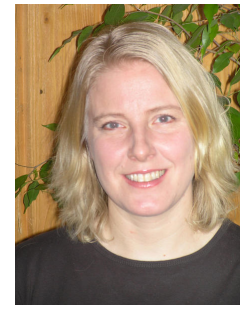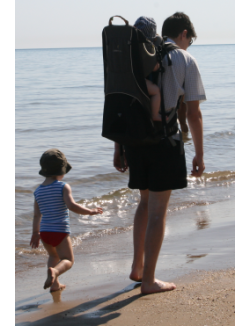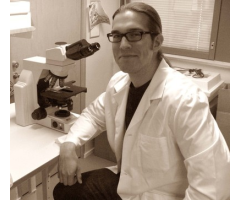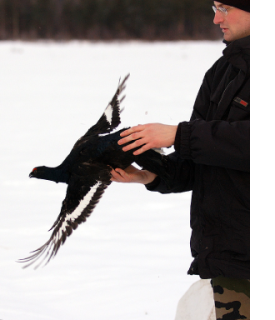Current Members
Heli Siitari
 I finished my PhD in the ecology of ultraviolet vision (UV vision) in foraging and mate choice in birds in 2001, and re-started the black grouse project together with Prof. Rauno Alatalo in the same year. At that time we also started to develop an eco-immunological research and laboratory at our unit. I have a good background for it, since my Master's studies included lots of courses in physiology and cell and molecular biology. Since 2001 many international PhD student and post-doc have visited our lab to learn the skills by analyzing samples related to their work. I did my post-doc studies investigating experimentally maternal effects and egg quality both in passerines (magpies and pied flycatchers mainly) and black grouse, and currently I hold an Academy Research Fellow in the project "Maternal effects and life-history evolution in wild populations". Since 2008 I have been mainly working with black grouse life-history evolution and the evolution of lekking as a mating system.
I finished my PhD in the ecology of ultraviolet vision (UV vision) in foraging and mate choice in birds in 2001, and re-started the black grouse project together with Prof. Rauno Alatalo in the same year. At that time we also started to develop an eco-immunological research and laboratory at our unit. I have a good background for it, since my Master's studies included lots of courses in physiology and cell and molecular biology. Since 2001 many international PhD student and post-doc have visited our lab to learn the skills by analyzing samples related to their work. I did my post-doc studies investigating experimentally maternal effects and egg quality both in passerines (magpies and pied flycatchers mainly) and black grouse, and currently I hold an Academy Research Fellow in the project "Maternal effects and life-history evolution in wild populations". Since 2008 I have been mainly working with black grouse life-history evolution and the evolution of lekking as a mating system.
I am generally interested in the evolution, with particular interest in evolutionary ecology (e.g. behavior, sexual selection, life-history evolution). I investigate the factors behind the fitness differences between individuals, and black grouse is a unique system for this since there is a high mating skew among the males. In addition to the genetic and environmental factors in general, I am currently interested in the possible epigenetic factors shaping the life of the animals in wild. If you are interested in joining our research group, please don't hesitate to contact me for possibilities. Click here for full copies of my CV and publication list.
Carl Soulsbury
 Background: I did an undergraduate degree in Zoology with specialisation in Animal Ecology at the University of Aberdeen. I graduated in 2001 with a 1st Class degree and was awarded the Nicol Prize for the top zoology student. I went onto do a PhD at at the University of Bristol and stayed on to do a postdoc. My current position at the University of Jyväskylä starts in November 2010 and in March 2011 was appointed and Associate Editor for Behavioral Ecology and Sociobiology and for Wildlife Research.
Background: I did an undergraduate degree in Zoology with specialisation in Animal Ecology at the University of Aberdeen. I graduated in 2001 with a 1st Class degree and was awarded the Nicol Prize for the top zoology student. I went onto do a PhD at at the University of Bristol and stayed on to do a postdoc. My current position at the University of Jyväskylä starts in November 2010 and in March 2011 was appointed and Associate Editor for Behavioral Ecology and Sociobiology and for Wildlife Research.
Interests: I am interested in all aspects of behavioural ecology, but predominantly in the area of sociality, individual fitness and life history tactics. My work is based on the examination and generation of long-term individual data and incorporates both broad-scale data such as behaviour (social interactions, spatial analysis, capture-mark-recapture) and population biology (population growth rates, group dynamics), as well as individual-based data including physiology (e.g. nutrition, reproductive and stress hormones), morphology (growth rates, body mass), immunology and genetics (e.g. parentage, pedigree reconstruction, reproductive success). My long-term aim is to work at the interface between environmental variation, individual fitness and population dynamics.
Matti Kervinen
 I took the first steps of my scientific adventure in the black grouse project in February 2008, when I started my MSc project. In my thesis I experimentally studied the effects of decoys and artificial hissing calls on age and sex structure of black grouse hunting bag in different habitats - lek arenas and clear cuts close to them. I finished the MSc studies in October 2009 and started my PhD project in January 2010. In my PhD thesis I study the ecological factors affecting the lifetime fitness of black grouse males. My aim is to disentangle which factors contribute most to the variation in male reproductive success and survival in different ages. I am widely interested in behavioural ecology and evolutionary biology, and I found it crucial to keep it in touch with nature. Thus, I enjoy studying behaviour and sexual selection in a wild animal population. Moreover, I am interested in wildlife management and conservation. On my free time I relax in many kinds of outdoor activities - hunting, fishing, picking berries and mushrooms, to name but a few. To enable these wonderful ecosystem services for everybody in future too, it is important to take care of the environment and use these resources responsibly in sustainable manners.
I took the first steps of my scientific adventure in the black grouse project in February 2008, when I started my MSc project. In my thesis I experimentally studied the effects of decoys and artificial hissing calls on age and sex structure of black grouse hunting bag in different habitats - lek arenas and clear cuts close to them. I finished the MSc studies in October 2009 and started my PhD project in January 2010. In my PhD thesis I study the ecological factors affecting the lifetime fitness of black grouse males. My aim is to disentangle which factors contribute most to the variation in male reproductive success and survival in different ages. I am widely interested in behavioural ecology and evolutionary biology, and I found it crucial to keep it in touch with nature. Thus, I enjoy studying behaviour and sexual selection in a wild animal population. Moreover, I am interested in wildlife management and conservation. On my free time I relax in many kinds of outdoor activities - hunting, fishing, picking berries and mushrooms, to name but a few. To enable these wonderful ecosystem services for everybody in future too, it is important to take care of the environment and use these resources responsibly in sustainable manners.
Christophe Lebigre
 I have very broad research interests spanning the fields of behavioural ecology, molecular ecology and evolutionary ecology. More specifically, I used the black grouse datasets to investigate the mechanisms underpinning the condition dependence of sexually selected traits (Lebigre et al. 2012, 2013), determine whether male philopatry allows for kin selection to occur on leks (Lebigre et al. 2008, 2014) and quantify the reduction in inbreeding risks associated with female biased-dispersal (Lebigre et al. 2010).
In addition to my work in Belgium (quantifying the relative contributions of geographic and environmental effects on the phenotypic and genetic characteristics of four butterfly species) I use the black grouse datasets to test the effect of kinship on male-male interactions and the links between variance in mating success and subsequent cohort genetic characteristics.
As an extension of my current work in Belgium and our knowledge of the black grouse, I am very interested in understanding the effect of the temporal variations in environmental conditions on the morphological, genetic and epigenetic characteristics of our study populations.
I have very broad research interests spanning the fields of behavioural ecology, molecular ecology and evolutionary ecology. More specifically, I used the black grouse datasets to investigate the mechanisms underpinning the condition dependence of sexually selected traits (Lebigre et al. 2012, 2013), determine whether male philopatry allows for kin selection to occur on leks (Lebigre et al. 2008, 2014) and quantify the reduction in inbreeding risks associated with female biased-dispersal (Lebigre et al. 2010).
In addition to my work in Belgium (quantifying the relative contributions of geographic and environmental effects on the phenotypic and genetic characteristics of four butterfly species) I use the black grouse datasets to test the effect of kinship on male-male interactions and the links between variance in mating success and subsequent cohort genetic characteristics.
As an extension of my current work in Belgium and our knowledge of the black grouse, I am very interested in understanding the effect of the temporal variations in environmental conditions on the morphological, genetic and epigenetic characteristics of our study populations.


